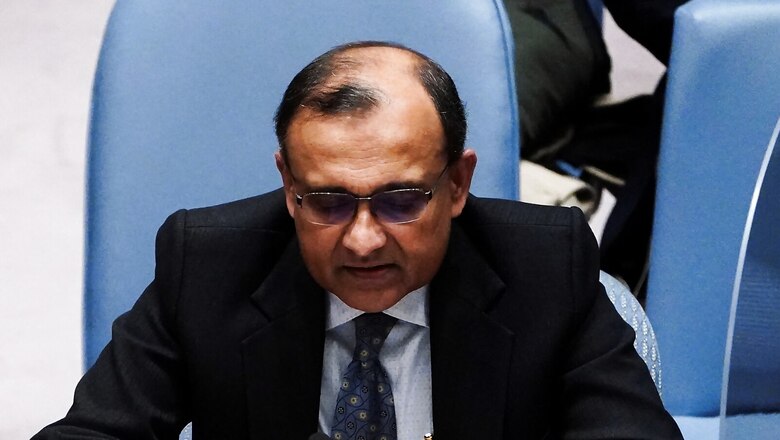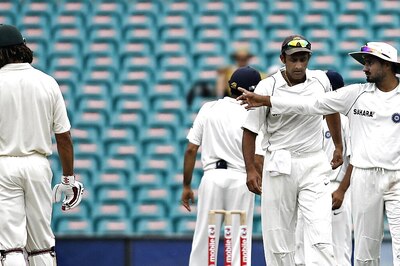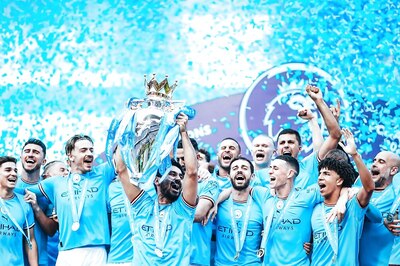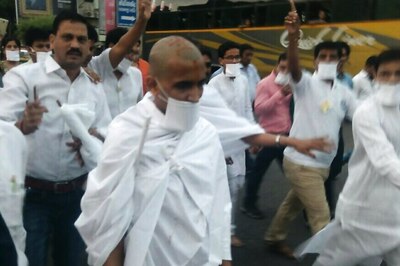
views
Russia’s invasion of Ukraine has sent global markets into a tailspin as global oil benchmark surged above $100 a barrel for the first time since 2014. American and Western companies seek to exit the Russian market, as a form of economic revolt as the United States government applies heavy sanctions on the Kremlin for Moscow’s aggression towards Kyiv.
The United Nations Security Council had called for an Emergency Session to discuss a US-sponsored UN Security Council resolution that “deplores in the strongest terms” Russia’s “aggression” against Ukraine. India abstained on two occasions at the Security Council.
The Security Council even called for convening of an emergency special session of the General Assembly, summoning the near 200-strong member delegation, the first time since 1982. This is only the eleventh time since 1950 when the General Assembly has been in emergency session.
India currently is a non-permanent member of the 15-member strong United Nations Security Council. While 11 voted in favour to condemn Russia, with Moscow voting against the resolution, there were three notable abstentions, India, along with China and the United Arab Emirates (UAE). India has now abstained from voting on matters related to Russia thrice within a week, twice at the UNSC alone and the latter at the General Assembly along with other South Asian neighbours of Pakistan, Sri Lanka and Bangladesh. India even chose to excuse itself from voting at the UN Human Rights Commission’s vote in Geneva, which called for an urgent debate to investigate the alleged human rights violations in Ukraine.
While this conflict is not central to India’s interests, there has been some disappointment and even ire as to why New Delhi has avoided public condemnation of Moscow’s unprovoked aggression.
Given the asymmetry of power and provocation, Russia has earned the censure of the global community and Ukraine has earned the sympathies. For many in the West, the matter seems simple, an open and shut case. It’s assumed that a country with liberal democratic values would naturally vote to condemn Russia for its unchecked and unprovoked actions.
New Delhi’s need to abstain has flummoxed many here in Washington, with some even going as far as to say that India as an aspiring power needs to take a firm stance. Here is why I feel that is missing the forest for the trees.
Firstly, unlike the West, and particularly the United States, India lives in a tough neighbourhood with two nuclear armed rivals and adversaries. Even now, China has positioned 60,000 soldiers in forward positions along India’s western Himalayan border following bloody clashes two years ago. India has a legacy of Russian-made military equipment since the late 1960s. According to SIPRI data, though India has been slowly reducing this dependency it still imports close to 50 per cent of its arms from Russia. It cannot afford to cut its primary military supply chain when it faces a hostile China. It was not an accident that when the Ukraine invasion took place, India and Taiwan were the two Asian countries who raised their state of defence preparedness – for fear Beijing would exploit the opportunity.
Secondly, New Delhi continues to urge Russia to de-escalate militarily, both at the UN and through a direct channel between Prime Minister Narendra Modi and President Vladimir Putin, and at the minister level between Foreign Minister Jaishankar and his counterpart, Sergey Lavrov. India has provided and continues to provide humanitarian assistance to Ukraine as the fighting continues.
Thirdly, the Indian public’s primary concern has been the evacuation of 22,000 Indians in the Ukraine, mostly students. The programme is largely over, but required the External Affairs Ministry to negotiate tirelessly with both Moscow and Kyiv to secure a ceasefire that allowed the Indians to be moved to neighbouring Eastern European countries.
I would like to explain India’s Ukraine response and its UN votes as being about India’s need to balance its interests and principles.
The statement, put out by T.S. Tirumurti, India’s lead envoy to the UN, showed that India condemns the conflict and aggression and urges peace through the path of diplomacy and welcomed the Russia-Ukraine dialogue at the Belarusian border. This is aligning with India’s principles of dialogue over dispute and diplomacy over diatribe. New Delhi has no doubts that the conflict is hugely destabilising, effecting the geopolitics of Asia in Beijing’s favour and making a post-pandemic economic recovery more difficult.
India abstained on the vote today in the UN General Assembly emergency special session resolution on #Ukraine.Our Statement on Explanation of Vote ⤵️ pic.twitter.com/5Y0KF1DGUu
— PR/Amb T S Tirumurti (@ambtstirumurti) March 2, 2022
But India’s hard-nosed security interests require it to keep a working relationship with Russia going. While India has monitored Moscow’s increasing closeness to Beijing, so far Russia has never baulked at providing military assistance to India even when it is in conflict with China.
India has also found it difficult to buy many types of weapons from the West. Its initial choice for a missile defence system was the Israeli Arrow, but this was blocked by the US for technological reasons. The US alternatives failed the Indian tests, leading an exasperated New Delhi to turn to the S-400 Russian system. No Western country is prepared to provide the nuclear-powered submarines and accompanying technology that India needs for its nuclear deterrence against China, only Russia is.
Yet India’s overall relationship with Russia has been on a downward trajectory for a number of years. Bilateral trade between the two was a negligible $7.5 billion in 2020. In comparison, the European Union has paid Russia close to $14 billion for oil and gas since the war began on February 24.
ALSO READ | Russia-Ukraine War: Europe’s Costly Energy Transition Has Accelerated the Great Power Contest
Hence, there needs to be nuance in understanding foreign policy and strategic interests and not seeing it as a compromise of principles. India asserts its “strategic autonomy” in part because it has a clear sense of the threats it faces, and will not compromise on seeking out assistance in handling them – irrespective of the nature of the realm they are dealing with.
However, India’s commercial and strategic partnership with the United States is already greater than its relationship with Russia. Washington and New Delhi share strategic concerns with regard to handling China and these were central to the Biden administration’s newly released Indo-Pacific Strategy. Their common interest in the Quad is a sign of the direction of India’s future. The upcoming Quad summit in Japan, following the foreign ministers’ meet in Melbourne, Australia, will see all four member-states further coalesce on advancing a free and open Indo-Pacific, enhancing connectivity across the region, and building resilient supply chains, climate action and securing the security of smaller states against larger adversaries.
While talks of CAATSA (Countering America’s Adversaries Through Sanctions Act) have continued given Russia’s invasion of Ukraine, Senator Ted Cruz rightly outlines that it would indeed be “extraordinarily foolhardy” to impose any sanctions on New Delhi as “the US-India alliance has broadened and deepened in recent years”. If anything, the US should double down on the India relationship. For example, to help India wean off its Russian arsenal, the US should take the lead in creating a Western consortium designed to make the necessary technology and weapon systems accessible.
New Delhi and Washington are not on different sides of the conflict in Eastern Europe, they just have different approaches based on their own strategic interests and diplomatic outreach. Both sides want peace in the region and a de-escalation. Hence the optics of voting cannot supersede the substantial nature of strategic interest, diplomatic heft, and a shared vision of a peaceful Indo-Pacific.
Mukesh Aghi is CEO and President, US-India Strategic Partnership Forum. The views expressed in this article are those of the author and do not represent the stand of this publication.
Read all the Latest Opinion News and Breaking News here




















Comments
0 comment